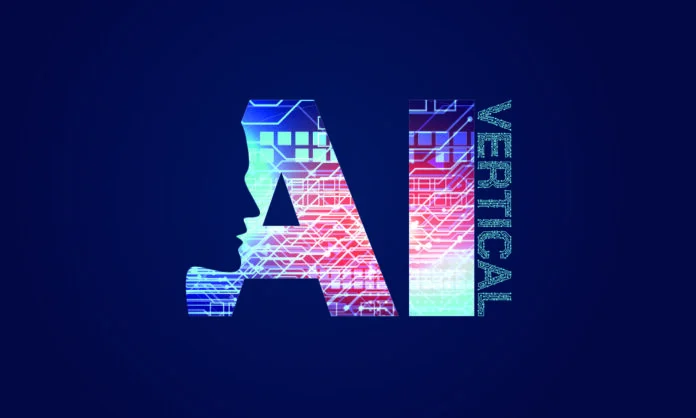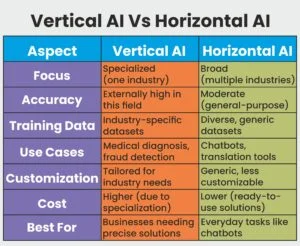Artificial intelligence (AI) surrounds us everywhere, from chatbots to self-driving cars, but not all AI works the same way. Some AI is broad, like jack-of-all-trades, while other AI is laser-focused on one industry. This specialized or narrow AI is called vertical AI, and it’s changing the game in healthcare, finance, and retail.
So, what sets Vertical AI apart? Why are companies moving towards it? Let’s understand the concept.
What is Vertical AI?
Vertical AI is the term used to describe IA systems created for one particular industry or function. Rather than attempt to do it all, it goes very deep into one area, providing customized solutions.
Key Features of Vertical AI:
Industry-specific: Built for sectors like healthcare, banking, or agriculture.
Highly Specialized: Familiar with industry terminology, regulations, and problems.
More Accurate: As it has chosen to concentrate on just one field, it provides improved outcomes.
For instance, a vertical AI in healthcare can identify illness from hospital reports, whereas a general AI may not be able to cope with medical terminology.
How is Vertical AI Different from Other AI Types?
AI comes in many forms, but the main types are horizontal AI, general AI, and vertical AI. Here’s how they differ from each other:
1. Horizontal AI: The ‘One-Size-Fits-All’ Approach
Works across multiple industries. For example, ChatGPT (for general conversations) and Google Translate (for language translation).
Limitation: Lacks deep expertise in any single field.
2. General AI: The Dream of Human-like Intelligence
A theoretical AI that can think, learn, and reason like humans. It doesn’t exist yet; scientists are still working on it.
3. Vertical AI: The Specialist
It focuses on one industry only. For example, AI is used for legal document review and AI is used for crop disease detection in framing. It is more precise and efficient in its niche.
Why is Vertical AI Gaining Popularity?
Businesses prefer vertical AI because it solves real-world problems faster. Here’s why:
Better Accuracy
Since it’s trained on industry-specific data, it makes fewer mistakes. A vertical AI in finance can predict stock trends better than a general AI.
Faster Decision- Making
Doctors use vertical AI for diagnostics to get instant, reliable insights instead of sorting through generic data.
Cost-effective
Instead of buying multiple tools, companies get one powerful AI that does exactly what they need.
Compliance & Security
Industries like banking and healthcare have strict rules. Vertical AI is built to follow these regulations, reducing legal risks.
Real-world Examples of Vertical AI
Healthcare: AI for Disease Detection
- IBM Watson Health analyzes medical reports to assist doctors.
- AI-powered tools like Zebra Medical Vision detect early signs of diseases from scans.
Finance: AI for Fraud Detection
- Companies like Feedzai use vertical AI to spot fraudulent transactions in real-time.
Agriculture: AI for Smart Farming
Blue River Technology uses AI to identify crop diseases and optimize pesticide use.
Legal: AI for Contract Review
- Tools like Ross Intelligence help.
- Lawyers analyze legal documents in seconds.
Vertical AI vs. Horizontal AI: Which is Better?
When comparing Vertical AI to other AI categories, the distinctions become clear. Horizontal AI serves as a broad, multi-purpose tool that can be applied across different industries. Think of chatbots or translation software. These work similarly whether used in retail, banking, or education.
Vertical AI differs significantly because it does not try to be everything to everyone. A legal vertical AI will be exceptionally good at analyzing contracts but wouldn’t be useful for medical diagnosis. This specialization comes with the advantages of higher accuracy, better compliance with industry regulations, and more relevant solutions for specific business problems.
If you need an AI that understands your industry inside out, vertical AI will help you.
Future of Vertical AI
As industries get more complex, vertical AI will grow smarter. We see more personalized healthcare AI for rare diseases, smarter farming AI to tackle climate challenges, and AI-driven legal advisors for instant case analysis. Companies investing in vertical AI today will lead tomorrow’s market.
Final Thoughts
Vertical AI is like hiring an expert rather than any general one. It’s precise, efficient, and built for real-world industry problems. While horizontal AI is great for everyday tasks, Vertical AI is transforming specialized fields like medicine, law, and finance. The future belongs to AI, which does one thing exceptionally well. And that’s exactly what vertical AI delivers.
Visit YourTechDiet today, for more informative blogs!
FAQ
1. Mention the difference between general AI and vertical AI.
Answer: Vertical AI focuses on a single industry (such as healthcare or finance), whereas general AI (which does not exist yet) would reason like humans in any domain. Vertical AI addresses definite challenges, while general AI is merely a hypothetical idea.
2. Mention the difference between Horizontal AI and vertical AI.
Answer: Vertical AI is specialized in one sector (e.g., medical diagnosis), whereas horizontal AI applies to numerous sectors (e.g., chatbots for customer support). Vertical AI is more specific, whereas horizontal AI is more general.
3. What are the types of AI?
Answer: There are four types of AI:
- Vertical AI: One industry specialist.
- Horizontal AI: Applies to many sectors.
- General AI: Future idea where AI is like human thoughts (not yet actual).
- Narrow AI: Basic AI that does one task (like a voice assistant).
Read on:
Can AI Replace Human Intelligence
Best AI Automation Testing Tools Explained
What Role Can AI Play in the Brainstorming Process?


